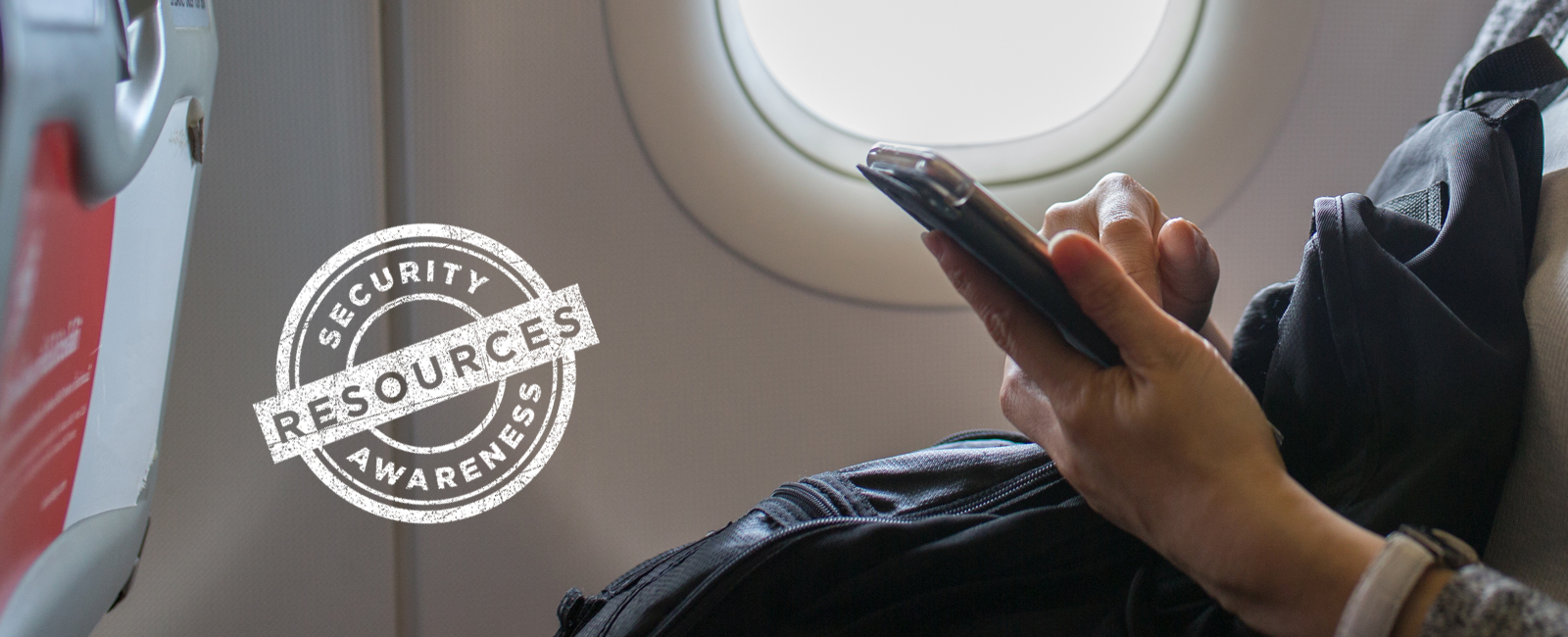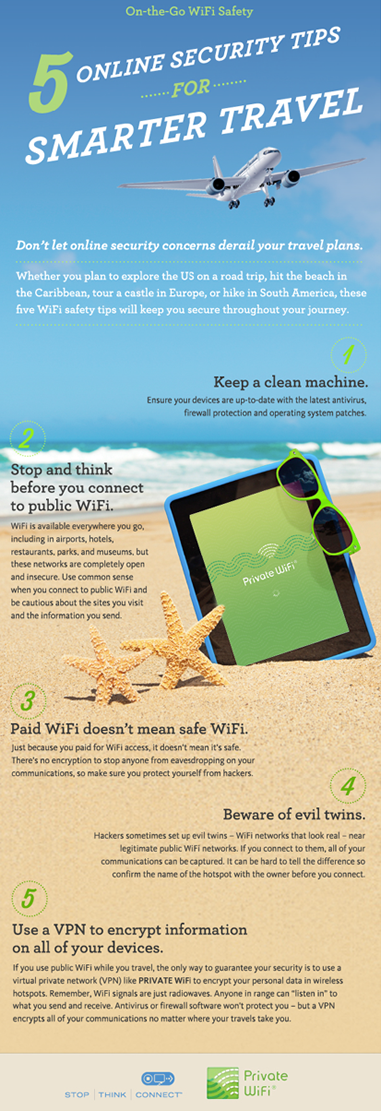Protect your data and devices when you travel. The twelve Security Awareness blogs feature ready-made content designed to enhance security awareness.

Campus Security Awareness Campaign 2019
This post is part of a larger campaign designed to support security professionals and IT communicators as they develop or enhance their security awareness plans. The campaign is brought to you by the Awareness and Training Working Group of the EDUCAUSE Higher Education Information Security Council (HEISC). View the other monthly blog posts with ready-made content at the security awareness resource page.
Almost 88 million Americans traveled abroad in 2017, and whether for business or personal use, our technology devices seem indispensable during our travels. Unfortunately, traveling with devices also means that you must take care to protect those devices—and the data contained on them—while you are way from home. That preparation begins before you leave, and you may need to restore settings when you return.
Get the Word Out
Newsletter or Website Content
Many people love the adventure that traveling provides: meeting new people, seeing new places, and having new experiences are part of the allure. Technology makes it easier than ever to satisfy our wanderlust. We can use our connected devices to discover the exotic locales we wish to visit, book tickets on planes and trains, practice driving virtually, and seamlessly navigate once we get to our final destination. For all this ease that technology brings, we should prepare our technology for travel as carefully as we plan our travel itineraries.
Travel tips
- Back-up your data! Backing up your data ensures that you won't lose information if your device is lost or stolen. Consider encrypting your data as well, but check with your IT support staff first about how best to implement encryption.
- Protect your devices with a strong password or lengthy passcode. Sometimes devices get lost or stolen, even when we are being careful. By protecting your device with a passcode or lengthy password, you make it harder for your device to be used and data to be accessed by others.
- Make sure your devices and applications are up to date. Keep your applications and devices up to date and patched. This helps protect your device and data from security vulnerabilities and threats.
- Just say no to unsecured public Wi-Fi. Having a wireless connection is almost a necessity for the modern traveler. However, using an unsecured public Wi-Fi hotspot can allow others to view the contents of your electronic activity. Never access your sensitive financial accounts from an unsecured network. If you must access sensitive data from an unsecured network, be sure that you use a VPN service.
- Double check your MFA settings. Many of us rely on multifactor authentication (MFA) to secure both personal and work-related accounts. Be sure that you know how (or if) that will work in the countries that you are visiting. For instance, if your MFA relies on SMS, be sure that you will be able to receive that message in the destination that you are visiting. If the option is available to you, consider using a physical token option to ensure you'll be able to login to your accounts.
- Update your physical location with your password vault. Many people use password vaults to manage all of their account passwords. Don't be surprised if your password vault requires additional verification steps when logging into it from a location that is not in your home country. (After all, we count on these vaults to be secure!) Check the vendor documentation or your account settings to make sure that there are no country restrictions or settings that you need to change before your trip. Also double-check that you're able to access your recovery/secondary email address just in case there is an issue.
- Consider leaving your daily devices at home. If you are traveling to a location where you are concerned about your individual privacy rights, consider leaving your primary mobile device at home and purchasing a replacement device to take with you instead. Put only the apps, services, and data that you need for that trip on the device. Some businesses and colleges and universities offer programs where a traveler can check out a "clean laptop" when traveling for business purposes. Using these types of devices help limit any exposure of your personal data. Check your data plan as well. A "burner phone" or car GPS may be cheaper.
- Be smart about posting on social media. It is always fun to post vacation pictures in the moment, but online postings on social networks (e.g., Twitter, Facebook, Instagram, Snapchat, etc.) can let other people know that you are not at home and that your home may be empty. Posting vacation pictures on social media once you are safely home helps protect your physical belongings.
- Use hotel safes to protect your technology. Here's another place where there is an overlap between online safety and physical safety. Just like you would put your passport, jewelry, and money in a hotel safe, consider using that safe to hold your electronic devices when you are not carrying them with you. Not only are the devices themselves expensive to replace, your personal data contained in the device can be irreplaceable (especially if you skipped the first tip on this list).
- Remember your adapters! Make sure you have power adapters that will work with three-prong plugs and that they fit the country's outlets. Some travel adapters only accept two-prong plugs. (If you're attending a conference, you may be able to borrow a charging cable temporarily.) Outlets also vary, even, for example, between the UK and Ireland. Your technology gadgets are not very helpful when they run out of charge or cannot be powered on. Charge and take a portable battery pack.
- Mind your voltage! Like plug types, different parts of the world use different voltages. Make sure that your technology devices can run on the voltage used at your destination. Getting shocked with 220V is not the same as 110V.
As surely as you can reduce wrinkles in your clothing with careful packing, so too can you avoid the most common technology travel woes by preparing before you leave home.
Social Posts
- Travel can be a great adventure; don't let an unsecured Wi-Fi hotspot cause an unexpected detour. Learn more about Wi-Fi hotspots and protecting your data: https://youtu.be/bzoEy-t8Y-8 #cyberaware
- What do you need when you travel? An umbrella, underwear, and updates. Remember to update your electronic devices before leaving home. #cyberaware
- Road warriors and happy wanderers need charging cables and VPNs. Know how to protect your electronic communications while traveling. https://www.pcmag.com/article/359499/how-to-set-up-and-use-a-vpn #cyberaware
Email Signature
Ask staff members to add a tip to their email signature block and link to your institution's information security page.
Example:
Jane or John Doe
Chief Information Security Officer
XYZ College or UniversityGetting Ready to Travel? [Link to your institution's information security page]
Embed or Share Videos
Resources
Share these resources with end users or use them to inform your awareness strategy.
- Download the US Federal Bureau of Investigation Safety and Security for the Business Professional Traveling Abroad brochure.
- Review the US Federal Communications Commission Cybersecurity Tips for International Travelers
- Download and read the US Customs and Border Protection's Inspection of Electronic Devices fact sheet.
- The Princeton University Information Security Office has published good guidelines for traveling abroad.
- Review the Cybersecurity While Traveling Tip Card, part of the STOP. THINK. CONNECT. Toolkit.
- Be prepared: Carry the Electronic Frontier Foundation's Border Search Pocket Guide.
- Learn more about Holiday Traveling with Personal Internet-Enabled Devices [https://www.us-cert.gov/ncas/tips/ST11-001] in this US-CERT guide.
- Considering Posting That Cute Vacation Selfie? (video)
Use These Images to Support Your Message


Ben Woelk is an Information Security Office Program Manager at Rochester Institute of Technology.
Joanna Lyn Grama is a Senior Consultant at Vantage Technology Consulting Group.
© 2018 Ben Woelk and Joanna Grama. The text of this work is licensed under a Creative Commons BY-NC-ND 4.0 International License.
